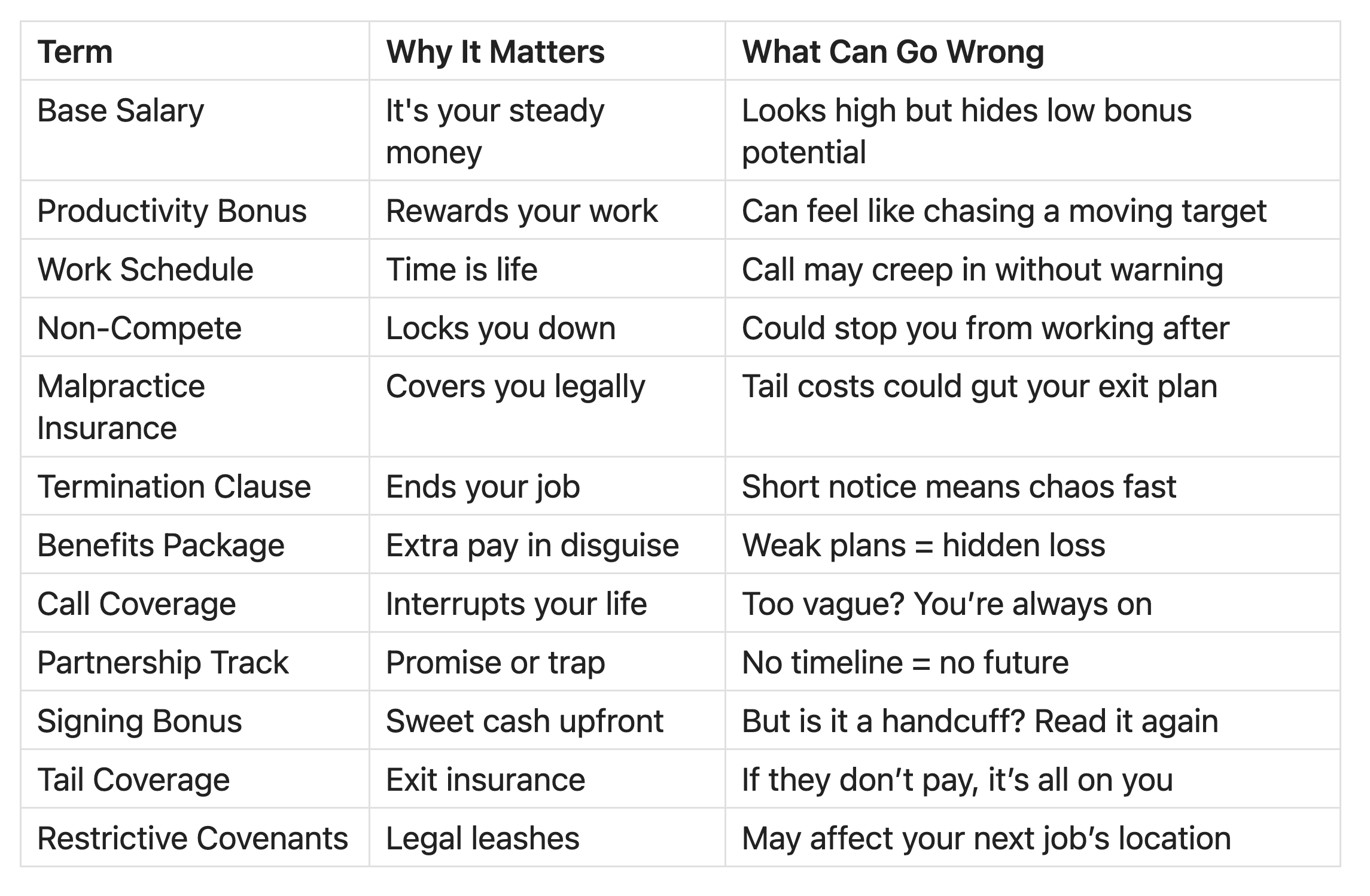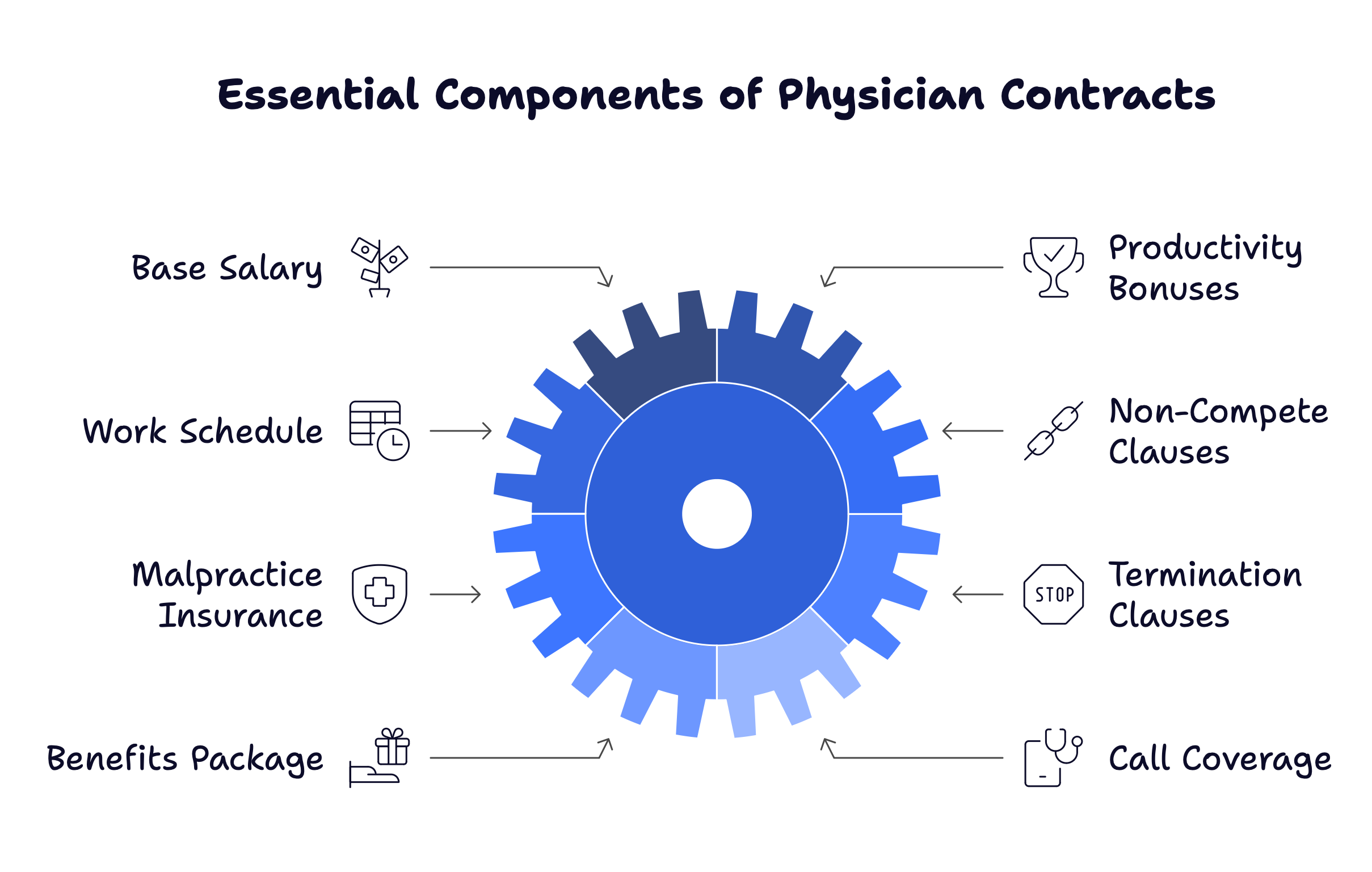
12 Essential Key Terms in Physician Contracts You Need to Know
1. Base Salary: Looks Big. Might Not Be.
Why do so many new docs brag about their salary? Why do they not talk about how they work 90 hours to get it?
So, what's the problem with a high base salary? It's got a lot of shine. But if your contract says you get $270,000 and then pays you like trash if you slow down or take leave, that’s where you realize the base isn't everything. Sometimes the employer inflates the number to pull you in, and buries the real math in formula-based compensation later.
Don’t just look at the number. Ask:
-
Does this include incentives or is this flat?
-
Does this drop after year one?
-
How does it stack against wRVU-based models?
Read it twice. Then again with someone who likes you.
2. Productivity Bonus: Sounds Motivating. Is Exhausting.
How much extra money are we talkin’ here?
That bonus can sound like the golden ticket, until you realize you're sprinting after smoke. Many new grads hear "bonus" and think it’s automatic. But what’s the threshold? How often does someone hit it? Ask to see what the last three hires earned. If they “don’t have that info,” that’s info.
And don’t forget, the "bonus" often replaces the bump in base they should've just given you in the first place. Take a look at compensation structures before you nod yes.
3. Work Schedule: It's Never Just M-F 8 to 5
You might think you’re signing for a 40-hour gig. But if your contract says “as required by employer needs”, yikes. That’s a free pass to your nights and weekends.
So ask:
-
Is this shift-based?
-
Is weekend call counted?
-
Is “administrative time” protected or nah?
Folks can burn out in 6 months because they didn’t ask. Call coverage creeps in without boundaries. Get the schedule in writing. Get it defined.
4. Non-Compete Clause: You Can Work... Nowhere?
Wait, so I leave this job and I can't work within 50 miles? For 2 years?
That's how wild non-competes get. And the worst ones? They don't even say how far. Just “within geographic area of practice.” No clue what that means.
Want a sneak peek into how bad this can go? Read this piece on restrictive covenants. And if they won’t drop it, ask for:
-
A shorter time period (e.g., 6 months instead of 2 years)
-
A smaller radius
-
A specialty-specific carve-out
5. Malpractice Insurance: Who Pays the Lawsuits?
This one ain't sexy. But if you mess it up, it’s financial death.
You need to know two things:
-
Is it occurrence-based or claims-made?
-
Who’s paying for tail?
If it's claims-made, you’ll owe tail insurance unless they explicitly say they’re covering it. That tail can cost $50k+. That’s not a typo.
Read more on tail coverage and insurance clauses before you sign your name to that liability.
6. Termination Clause: How Fast Can They Dump You?
Two words: “Without Cause.” Scariest words in the whole contract.
Most employers can terminate you with 60 or 90 days’ notice. That’s it. No reason needed.
Which means you could be out of a job, out of insurance, and out of income in two months, while still owing a tail premium or signing bonus clawback.
If you want to know how to read this part right, start here and then mark your calendar. Track your renewal dates like your life depends on it. ‘Cause sometimes it does.
7. Benefits Package: The Invisible Half of Your Pay
Everyone focuses on salary. But benefits? That’s like $20k–$40k of extra value if done right.
You need to ask:
-
Is health insurance actually decent?
-
Is there a 401(k) match?
-
Do you get a CME allowance?
Some places will throw a shiny salary but then make you pay $1,500/month for a plan with a $9k deductible. Don't fall for that.
8. Call Coverage: The Hidden Schedule Killer
Let me guess... “Call is shared equally among physicians.” That’s the line they all use.
But who’s counting?
-
What if 2 of the docs are on vacation half the year?
-
What if the group loses someone, do you pick up their call?
-
Is call paid?
You better ask. Or you’re gonna live with your pager like it’s a part of your body.
Wanna win here? Push for limits. Max call days per month. Pay per shift. Or... skip the place. You got options.
9. Partnership Track: Or is it a Hamster Wheel?
Ever see “2-year path to partnership” in a contract? Ever ask, “Path to where though?”
Make sure it’s not just a dangling carrot. Get the criteria in writing.
Ask:
-
What metrics are used for promotion?
-
Is there a vote?
-
Can you buy in?
And ask what happens if you don’t want to be a partner. Do they cut your pay? Do you get booted?
A partnership track with zero defined terms is just a fancier way to delay raises.
10. Signing Bonus: Golden Handshake or Golden Handcuff?
Yeah, that $20k looks real sweet. But now read the fine print.
Is it forgivable? Is it repayable? What happens if you leave early?
Some places will ask for the money back, plus interest, if you break the contract. Some say it’s prorated. Some don’t say at all.
Ask before they hand you a check.
11. Tail Coverage: The Most Ignored Financial Bomb
We talked about malpractice above. But tail deserves its own spotlight.
Tail coverage kicks in after you leave. You need it if someone sues you after your job ends for something that happened during your job.
Most new grads miss this. Then they leave and get hit with a $60,000 bill.
If you want to keep your house, make sure they're paying your tail.
12. Restrictive Covenants: Invisible Chains
These are extra rules that can bite you after you leave. They include stuff like:
-
Can’t hire your old MA
-
Can’t take your patients with you
-
Can’t talk about your time at the job
These are ugly legal booby traps. And you need someone to read them who’s not sleep-deprived post-call.
Learn First, Then Lawyer Up
Before you pay $500–$2,000 for a lawyer... you need to know what you're even asking them to look for. That’s where The Real Contract Course changes the game.
Here’s what it gives you:
-
A dead simple breakdown of red flags
-
Terms you need to push back on (and how)
-
The confidence to walk away from garbage deals
This is the prep you need before the meeting. It's made by someone who’s reviewed 1,000+ contracts. And who actually speaks human.
Take this course, then take your power back.









